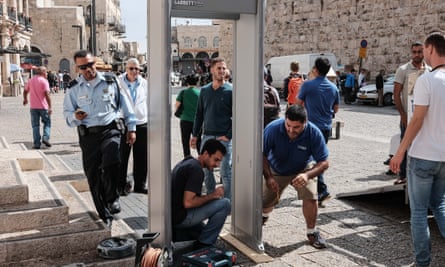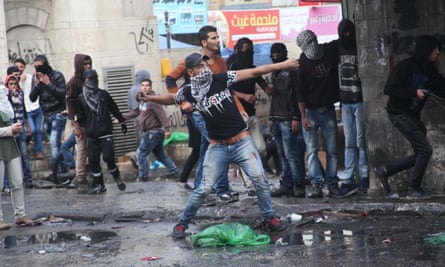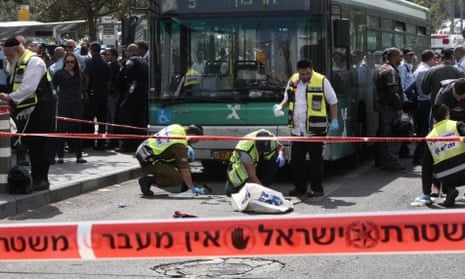A Palestinian has died after being shot in clashes with Israeli security forces in Jerusalem, as another day of violence saw four stabbing attacks on Israelis and raised fears of further escalation on Friday, when thousands of Palestinians will enter Jerusalem’s old city to pray.
Ahmad Bitawi, the director of Ramallah hospital in the West Bank, said Wissam Jamal, 20, had arrived with a bullet wound to the chest. Witnesses in the Shuafat refugee camp in Jerusalem said clashes had broken out between Palestinian protesters and Israeli forces.

Separately, police in Tel Aviv shot and killed a man who attacked four Israelis with a screwdriver, while two Israeli soldiers were stabbed in separate incidents and a Jewish student was stabbed in Jerusalem.
There are fears that the increasingly violent clashes will erupt before Friday prayers at al-Aqsa mosque, access to which has been heavily restricted in past weeks.
Israeli police have begun installing metal detectors around the entrances to the old city and on some streets inside. Nir Barkat, the mayor of Jerusalem, urged residents with gun licences to carry their weapons at all times.
“Given the current escalation in the security situation, those with a licensed firearm who know what to do with it must go out with [their weapon] – it’s an imperative,” Barkat told Army Radio. “In a way, it’s like military reserve duty.”
In an effort to calm the tensions, the Israeli prime minister, Binyamin Netanyahu, banned all Israeli cabinet ministers and MPs from visiting the hilltop compound that houses al-Aqsa mosque. The site is revered by Muslims as the place where the prophet Muhammad ascended to heaven and by Jews as the site of the two Jewish biblical temples.
The move has put the Israeli leader on a collision course with hardliners in his governing coalition, who have been putting intense pressure on him to respond to the surge in violence with a tough crackdown and increased settlement activity. Several Arab members of the Knesset said they would defy any ban.
In the first attack on Israelis on Thursday, a Palestinian stabbed a 25-year-old man in Jerusalem, leaving him in a serious condition. The 19-year-old attacker was arrested. Later in the day, an Israeli soldier and three passersby were stabbed in Tel Aviv and the attacker was killed.
In a third attack, a Palestinian stabbed an Israeli near the Jewish settlement of Kiryat Arba in the West Bank, the military said. The victim was seriously wounded and the attacker fled. And on Thursday evening a soldier in the northern Israeli town of Afula was stabbed and his attacker captured, authorities said.
Four Israelis and seven Palestinians have been killed over the past week. Hundreds of Palestinians have also been wounded in demonstrations and clashes across the West Bank and east Jerusalem.

The latest unrest began about three weeks ago as Palestinians repeatedly barricaded themselves inside the mosque and hurled stones, firebombs and fireworks at the police. The violence later spread to Arab neighbourhoods of east Jerusalem and to the West Bank, and on Tuesday there were disturbances in Jaffa, a largely Arab area of Tel Aviv.
Many Palestinians believe Israel is trying to expand Jewish presence at the site, a claim Israel adamantly denies. Under a longstanding arrangement administered by Islamic authorities, Jews are allowed to visit the site during certain hours but not pray there.
